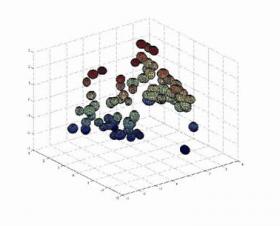在心理学中,当人作出某一决策后如果被证实正确并产生了好的结果,大脑会向负责决策的区域发送“奖赏”信号,这会促进人的认知能力进一步提升,形成良性循环,这被称作“奖赏效应”。德国和英国研究人员的一项最新研究揭开了大脑中“奖赏效应”的具体机制。
研究人员在新一期美国网络期刊《公共科学图书馆生物学》(PLoS Biology)上介绍说,他们的实验发现,“奖赏效应”提升人的认知能力是因为“奖赏”信号会刺激大脑的某些皮层,使大脑活动活跃。
实验中,参与者的手指接通电极,然后感觉并判断哪一次的通电电流频率更高,如果判断正确就可获得奖励。结果发现,随着奖金数目的累加,参与者的判断正确率越来越高。这也说明,“奖赏效应”不仅能提高认知能力,还会影响到大脑中负责体感的皮层。
另外,实验还发现,神经递质多巴胺的水平对于“奖赏效应”十分关键。注射了类多巴胺物质的参与者的“奖赏效应”明显增强。注射了多巴胺抑制剂的人则根本体现不出“奖赏效应”。研究人员说,将来通过调节多巴胺的水平,可以强化大脑“奖赏效应”,有望帮助中风等疾病的患者提高认知能力。
心理学之家 推荐原文原始出处:
PLoS Biol 7(7): e1000164. doi:10.1371/journal.pbio.1000164
Influence of Dopaminergically Mediated Reward on Somatosensory Decision-Making
Burkhard Pleger1,2*, Christian C. Ruff1,3,4, Felix Blankenburg1,3,5, Stefan Kl?ppel1,6, Jon Driver1,3, Raymond J. Dolan1
1 Wellcome Trust Centre for Neuroimaging at UCL, London, United Kingdom, 2 Department of Cognitive Neurology, Max Planck Institute for Human Cognitive and Brain Sciences, Leipzig, Germany, 3 UCL Institute of Cognitive Neuroscience, London, United Kingdom, 4 Laboratory for Social and Neural Systems Research (SNS), Institute for Empirical Research in Economics, University of Zurich, Switzerland, 5 Department of Neurology and Bernstein Center for Computational Neuroscience, Charité, Berlin, Germany, 6 Department of Psychiatry and Psychotherapy, University of Freiburg, Freiburg, Germany
Reward-related dopaminergic influences on learning and overt behaviour are well established, but any influence on sensory decision-making is largely unknown. We used functional magnetic resonance imaging (fMRI) while participants judged electric somatosensory stimuli on one hand or other, before being rewarded for correct performance at trial end via a visual signal, at one of four anticipated financial levels. Prior to the procedure, participants received either placebo (saline), a dopamine agonist (levodopa), or an antagonist (haloperidol). Principal findings: higher anticipated reward improved tactile decisions. Visually signalled reward reactivated primary somatosensory cortex for the judged hand, more strongly for higher reward. After receiving a higher reward on one trial, somatosensory activations and decisions were enhanced on the next trial. These behavioural and neural effects were all enhanced by levodopa and attenuated by haloperidol, indicating dopaminergic dependency. Dopaminergic reward-related influences extend even to early somatosensory cortex and sensory decision-making.
www.nmgpsy.com内蒙古心理网





